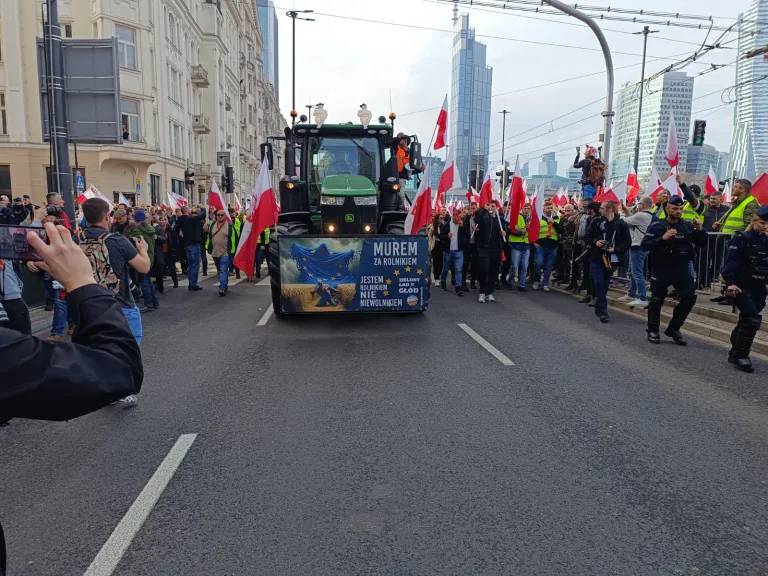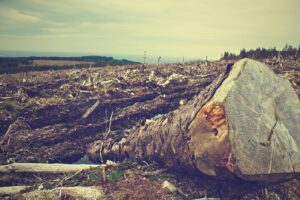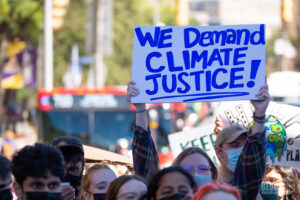The farmers’ protests that have swept Poland in recent weeks have exposed many of the incongruities lying at the heart of EU and Polish politics.
Farmers’ protests have swept Poland in recent weeks, following a wave of similar actions across the European Union. They have exposed many of the contradictions at the heart of Europe’s agricultural policy and the increase in social tensions across Europe. Polish farmers have blockaded the border crossing to Ukraine, spilt grain on the roads, and organised two large demonstrations in Warsaw, one resulting in violent clashes with the police. These protests seem set to continue and even intensify, with over 70% of Polish society expressing their support for them.
The demonstrators have focussed their anger on two main areas: the European Union’s Green Deal and the opening of the EU’s market to Ukrainian grain and other agricultural products. Sections of the far-right have expressed their solidarity with the farmers, seeing them as a vehicle to promote climate change scepticism, support for Poland leaving the European Union and hostility to Ukrainian immigrants. Meanwhile, the left has remained disorientated and unsure of how it should react to this social movement. The mainstream centre-left has either ignored or been hostile to the farmers, with some claiming that they represent right-wing, nationalist, and even ‘pro-Putin’ sentiments. Meanwhile, another smaller section of the left has uncritically supported the farmers, believing it is a social movement of the popular masses that challenges neo-liberal capitalism.
Monopolisation of Farming
To understand the true nature and significance of the farmers’ protests, it is necessary to approach the issue from a class perspective and understand how farming has transformed in recent decades. Poland was almost unique amongst the former Eastern bloc countries, with its farming sector dominated by small-holder, often subsistence-based, farmers. This situation changed after the transformation to capitalism and then Poland’s entry into the European Union.
A specific feature of Polish agriculture is that the vast majority of the country’s agricultural land was not collectivised after the Second World War. The number of farms in Poland declined from around 2 million in 1996 to 1.3 million in 2020, although it is estimated that only about 400,000 of these farms produce goods for sale on the market. The remaining farms are used to supplement the income of people working in other jobs or are rented for use by larger farm owners. Since the early 1990s, the number of those employed in farming has shrunk from over 25% to around 8%, with most of those living in the countryside no longer employed in farming. The decline in the number of farmers in Poland has been accompanied by the concentration of farm ownership and growth in the average size of farms. 11.3% of farmers (around 146,000) own 20 or more hectares of land, making up 53.4% of farming land. It is estimated that these farmers could operate up to two-thirds of all farming land when the leasing of other farmers’ land is taken into account. The average size of a farm in Poland, 11.1 hectares, was 13% larger in 2020 compared to a decade earlier.
This concentration and monopolisation of Polish farming is replicated throughout the European Union. Between 2005 and 2020, the number of farmers reduced by 37% in the EU countries (in Poland 47%), with the number of farms with less than 5 hectares of land falling by 4.6 million during that time.
The situation is even more pronounced in Ukraine. An act introduced in March 2020 allowed for the free trade in agricultural land from 2021. This has accelerated the buying up of farmland by large agricultural companies (already in 2019 only 27 % of farmland was utilised by individual farmers) and the emergence of a new class of agricultural oligarchs possessing assets estimated at hundreds of millions of dollars. Foreign capital (the largest proportion coming from the USA and Saudi Arabia) owns large shares in these agri-companies and already entities from outside of Ukraine possess around 10% of its agricultural land. In 2020, agricultural products made up around 45% of Ukraine’s total exports, with the production of wheat, maize, barley and oilseed crops mostly export-orientated.
The European Union, Polish and Ukrainian farming sectors are therefore undergoing similar processes of monopolisation. The European Union has internally encouraged this through supporting the World Trade Organisation’s liberalisation of global agricultural markets. The provision of direct subsidies to European farmers through the Common Agricultural Policy (CAP) created domestic surpluses and the dumping of food in poor countries which reduced their food security, making them dependent upon ‘cheap’ imported food, thus pushing many small farmers out of business and leading to higher prices and even hunger. Since their introduction in 1963, 80% of CAP direct subsidies have gone to just 20% of farmers in the EU, which has intensified the concentration of EU farming.
Neo-Liberalism and the Green Deal
In recent years, the EU has announced its aim to move towards a more sustainable agricultural model, primarily through the agricultural part of its Green Deal: the ‘Farm to Fork’ Strategy. It recognises that the agricultural sector (which is responsible for nearly one-third of CO2 emissions globally and 10% of the EU’s emissions) consumes huge amounts of natural resources, resulting in biodiversity loss, negative health impacts and inequalities amongst producers. The ‘Farm to Fork’ strategy is supposed to represent a shift away from direct farmers’ subsidies and intensive farming practices towards protecting nature, supporting small farmers and promoting eco-farming.
Two combined pressures are preventing European agriculture from moving towards a more environmentally and socially sustainable model. Firstly, the free trade agreements made between the EU and various countries and regions place competitive pressures on European farmers. The EU, for example, is in the process of negotiating a trade deal with Mercosur countries (Brazil, Argentina, Paraguay and Uruguay), although this has not yet been ratified by either side. Secondly, European farming has increasingly transformed in recent decades into a system dominated by large industrial farms operating according to the logic of private capital accumulation and profit. To compete on the international market the owners of these agri-businesses seek (as any good capitalist would do) to push down the costs of production in an attempt to preserve and raise their profits.
Inevitably, the owners of large farms have lobbied the EU to remove some of the regulations placed upon them through the ‘Farm to Fork’ strategy. Therefore, as the European Coordination Via Campesina (ECVC), which represents small-holder farmers in Europe, has pointed out, instead of protecting small and medium farmers to help them transition to agroecology, the EU has instead caved in the demands of big farmers and agribusiness by reversing the provision to halve the use of pesticides by 2030. Some EU countries have also abolished some of their environmental measures, with France pausing its plan to reduce the use of Ecophyto pesticide and Germany abolishing its plan to scrap tax breaks on farming vehicles and lift subsidies on off-road diesel fuel.
Open Markets
Polish farmers, similar to their counterparts in other countries, have faced rising economic pressures in the wake of the pandemic and outbreak of the war in Ukraine, as energy and other production costs have soared. This came to a head after the EU’s decision to open up its market to Ukrainian agricultural imports. Over half of all of Ukraine’s land (32 million hectares) is arable land, which is equivalent to one-third of all arable land in the EU. The flooding of the EU’s market with cheap Ukrainian grain has placed further pressure upon Polish farmers. In 2022, compared to 2021, the volume of wheat imports from Ukraine to Poland increased by nearly 17,000%, corn by 30,000% and rapeseed by 662,000%. Despite pressure from the European Commission, the new Polish government does not want to reopen its borders to Ukrainian imports. It is estimated that of the 4.1 million tons of Ukrainian grains that entered Poland from April 2022 to March 2023, 3.4 million tons remained either stored or sold within the country, while only 700,000 tons were exported to other countries. Polish farmers also worry that even if Ukrainian grain were to pass through to other countries, this would reduce their opportunities for exporting grain throughout the EU.
It is in these conditions that the Polish farmers have protested in Poland. Unsurprisingly, these protests have been led primarily by the owners of large farms, who, already under pressure due to rising costs, and often burdened with debt after buying new tractors with EU loans, are now competing with large agri-businesses in Ukraine which are not required to meet the regulations set down in the EU’s Green Deal. Their response has been to argue for a reform of the ‘Farm to Fork’ strategy and to maintain the ban on Ukrainian agricultural imports. PM Donald Tusk (former European Council President and leader of the European People’s Party) has backed the Polish farmers by demanding that the EU suspend or withdraw virtually all of the agricultural regulations included in the Green Deal.
A Left Alternative?
The farmers’ protests have exposed many of the incongruities lying at the heart of EU and Polish politics. The attempt to reform European agriculture in a more eco-friendly and sustainable direction has met the obstacle of its neo-liberal economic model. Economic pressures have meant that agro-industrial groups, through mergers and speculation, have increased in size and strength and are pushing the European Union towards further deregulation. The pandemic and war in Ukraine have exacerbated such social and political tensions and brought to the fore the limitations of EU policy.
The Polish and European left must outline a progressive alternative, based upon a vision of a peaceful, equitable and secure Europe. It should recognise the legitimate concerns of the farmers in Poland and other European countries and not leave this movement to the far-right. Polish and European farmers cannot be expected to meet environmental standards whilst competing with large industrial agri-businesses importing products into the European market. At the same time, small and medium farm owners cannot compete with large farms and agri-businesses (receiving huge EU subsidies) which are intensifying their production through the use of damaging pesticides. The left needs to resist the demands to reduce the state regulation of farming and the move away from a strategy of creating a sustainable farming sector.
An alternative New Green Deal is required which would involve opposing the liberalisation and financialisation of agriculture in Europe, and the monopolisation of this sector, whilst promoting policies that support small and medium farms as the basis of a more sustainable, ecological and equitable farming sector.
This article has first been published on the Cross-border Talks website.
Cover photo: Farmers’ protests in Warsaw. Photo by author.



